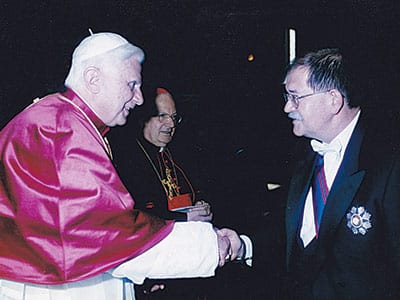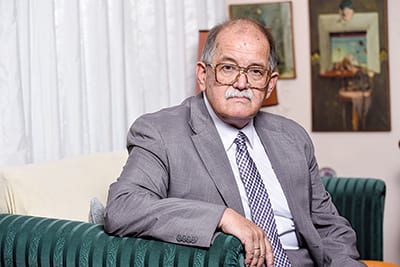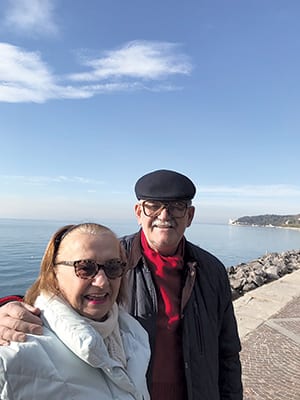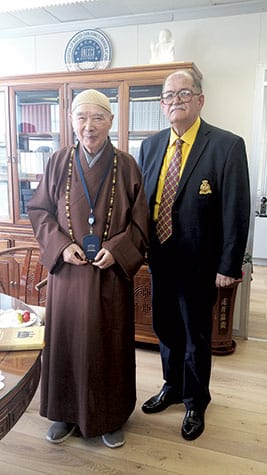His parents provided him with a good upbringing, he completed oriental studies with ease, earned his doctorate and spent most of his career as a university professor. He also proved himself to be a good diplomat as ambassador to Turkey, the Holy See and UNESCO. This month he speaks to CorD about his upbringing, his family, Islam, Serbia and the EU, but also French President Macron.
His scientific, academic and diplomatic career placed him at the very top of Serbia’s intellectual elite. With his mastery of five or six languages, completed studies in orientalism, tolerance and the broad general education of this erudite have ensured that Darko Tanasković (1948) is welcome everywhere. He welcomed and bid farewell to generations of students at the Department of Oriental Studies, as a beloved and respected professor, and also left a significant mark during the 15 years he spent engaged in diplomacy.
He explains that the deeper roots of Tanaskovićs can, apparently, be traced back to Herzegovina, and he reminds me that Momo Kapor, a dear friend of both of us, would ask half-seriously in jest: “Is there anyone who doesn’t have their origins in Herzegovina?” Retreating away from the advancing Turks, Darko’s Tanaskovićs moved to Western Serbia, while his father, Rajko, was born in Preljina. His mother, Ines Wesley, was born in Sremska Mitrovica and lived there prior to World War II, and there Darko’s grandfather, Ljudevit – a native of Hrvatska Kostajnica (Croatia) – was a major landowner and prominent citizen. As a hydro engineer, he designed embankments to defend Mitrovica against previous regular floods. He is also remembered as a benefactor of the Mitrovica Gymnasium High School:

“Unfortunately, I didn’t get to meet either grandfather. Velimir was shot and killed, under unclear circumstances, in 1941. And in order to confiscate all of his property, Ljudevit was convicted without foundation in 1945 as “a collaborator with the occupier and an enemy of the state”. He soon fell ill and died in prison. We don’t even know where he was buried. He was posthumously acquitted by the court in 2010.”
His parents behaved responsibly and normally, and it was mostly through their personal example that they influenced the upbringing of their children – Darko and his sister Stanka:
“I thank them for that, because later in my life – and particularly since I became a parent – I realised that the excessive mystifying of the upbringing of children often leads to the wrong path. I was expected to achieve results, and I was provided with all the necessary conditions to dedicate myself to achieving them. My parents placed a focus on me receiving high-quality education and not on growing accustomed from an early age to receiving money without any effort or justification. I’m also obliged to point out the role played in the early years of forming my personality by my gentle and wise grandmother Ivanka, who gifted me generously with love and lessons during my childhood in Zagreb.”
My parents placed a focus on me receiving a highquality education and not on growing accustomed from an early age to receiving money without any effort or justification
Darko has many reasons to be proud of his parents. First and foremost, Rajko and Ines were honest people with unwavering moral integrity. And they were also top experts in their respective areas of expertise:
“As an educated ‘pre-war’ officer, and later senior military leader, my father achieved remarkable achievements in military science. He was also the first doctor of military science (after Tito, who received an honorary PhD) and authored several books that are still considered fundamental to the military theory and education, particularly Pitanja partizanskog ratovanja [Issues of Partisan Warfare] and Štabovi u ratu i miru [General Staff in War and Peace]. His mother, one of the first to earn a doctorate in medical sciences in our country after WWII, possessed an extremely broad education and mastered several foreign languages.
 At the global level, she was among the pioneers of introducing modern computing to biology and medicine, she established an information system at the Military Medical Academy, published papers in the most prestigious scientific journals (such as Nature) and at one point served as the president of the UN University Council in Tokyo. Despite all of this, my parents were personally extremely humble people, without any sense for self-promotion or excessive desires. How could one not be proud of them? It was much tougher to follow their example.”
At the global level, she was among the pioneers of introducing modern computing to biology and medicine, she established an information system at the Military Medical Academy, published papers in the most prestigious scientific journals (such as Nature) and at one point served as the president of the UN University Council in Tokyo. Despite all of this, my parents were personally extremely humble people, without any sense for self-promotion or excessive desires. How could one not be proud of them? It was much tougher to follow their example.”
From today’s perspective, with subsequent intellect and the tenderness of memory brought by recollections of youth, Darko has nothing to criticise them for. On the contrary! Earlier, of course – like every child, depending on their age and circumstances – he was inclined to criticise them, with or without a reason, and occasionally be angered by them:
“With my dad, I was bothered and burdened by his Spartan-like military strictness and precision in everything, which back then seemed obsessive to me. I even considered that he didn’t love me at all. He wasn’t capable of giving praise, rather he considered that which was done well to be normal and he felt it was his duty to be critical when something wasn’t done right. I felt like that was unjust. My mother was an intimate sanctuary for me in such situations, but it somehow seemed to me that she didn’t take me seriously enough.”
Even if the problem of “Kosovo” is somehow cleared from the agenda (though I don’t see how that could happen in the foreseeable future) and the famous ballast (perfidious and incorrect) of Chapter 35 in EU accession negotiations have been resolved, ahead of Serbia will still be a long road of conditioning and proving itself to the ill-disposed and cynical European arbiters of our dignity
What connotation on the time of Darko’s youth did the term “general’s child, general’s son” have? How much did that feel like an obligation or a burden, or how much did it ease his life?
“Thanks precisely to the way my father held himself in life, I was never afflicted by the “general’s son” complex, although sometimes – especially later – some people tried to disturb my balance or underestimate me by emphasising that attribute, which I neither deserved nor was guilty of expressing. Imagine how absurd and ridiculous it is when you’re in your 60s and it’s suggested that your main characteristic is that you’re a “general’s son”, as if you’ve achieved everything in your life on the basis of that status and that you didn’t do anything yourself.

And the reality is completely the opposite, if I exclude the decent standard of living and opportunity to be educated solidly in my youth, I wouldn’t say that the fact I had a general as a father was beneficial in any way, or helpful in heading along the road of life, or at university and in my diplomatic journey. And when undertaking my military service it was even harder for me…”
Darko and his wife Vesna raised three successful children and are proud of them with reason:
“One of my colleagues had the habit of saying “there’s no tougher craft than parenting”. There are some general rules, but every tangible situation/ individual, and the establishing of interactive parent-child relationships, is specific. With our children – son Marko and daughters Jelena and Marija – we tried to raise them unobtrusively, or for them to develop themselves, the characteristics of balanced individuals with a stronghold based in a system of values founded on confirmed and undisputed ‘cardinal/moral/virtues’, to utilise a term from antiquity. I believe we succeeded in that. Our children are today mature, excellently educated people who certainly go through life with an awareness of their responsibilities, but also their rights. Everybody can rely on them with confidence, including us, as their parents. As we’re on the threshold of old age, that fills us with serenity, satisfaction and (why not?) pride.”
Your Excellency, when all this passes – and it must pass, because everything is transient – please do the most you can with your power to influence the Serbs so that they are not angry with us – just because we are Turks – more than they are with others who are this time far more responsible for the misfortune that has befallen you
It’s difficult to believe the story that Darko enrolled in oriental studies coincidentally. However, if coincidence even exists in such choices, then his 1966 decision to enrol in Oriental philology at the Belgrade University Faculty of Philology actually did happen by chance. He hadn’t previously even considered such a direction. However:
“A summer conversation by the sea with a girl studying Anglistics led me to look into that side. Specifically, casually, unobliging conversationally, she wrote my name in Arabic letters on a packet of Drina cigarettes from Niš, saying that she’d learned them from a colleague who was studying Orientalism. I liked the idea that this could be learned, and then I began – in the ‘classic’ way – to develop and build on that in the spirit of the old Latin phrase ‘Ex Oriente Lux’ [out of the east, light comes], so that’s how I found myself in the Department of Oriental Studies. And I didn’t regret it. Adding a special note to this true anecdote is the fact that I found that fateful box of ‘Drina’ a few years later in the pocket of my old trousers and … concluded that my name wasn’t even written in Arabic letters!”
I recently watched a documentary on Al Jazeera in which Ivan Ejub Kostić – a former student of Darko Tanasković who’s preparing his doctorate – spoke. Ivan is actually the son of famous Serbian composer Vojislav Voki Kostić and actress Stanislava Pešić. In this documentary, Ivan Eyub explained why he converted to Islam, along with other speakers who decided, as adults, to replace Orthodoxy with Islam. After such a revelation, the question that imposes itself is why, in recent years, it has become more attractive for people born as Orthodox Christians to convert to Islam and not vice versa? Responding to this question, CorD’s interlocutor says:

OF CHINESE BUDDHISM QIN KUNG
“I’d like to have seen that broadcast because it isn’t clear to me why this gifted former student of mine embraced Islam. I suppose that the urge to make such a decision should be sought in the individual-psychological and, possibly, microsocial sphere. I wouldn’t say that conversions from Christian Orthodoxy to Islam represent a particularly pronounced tendency, despite there being such cases, as well as the acceptance of Christianity among former Muslims. For Muslims, in principle, religious conversions are riskier, because apostasy is punishable by death under sharia law, and their degree of religiosity is higher on average. Otherwise, when it is noted today that someone has converted from one faith to another, one should consider that many of our contemporaries, especially (post-)Christians, are secularised to a great extent, or are atheists, so a question arises as to the spiritual starting point from which they embark on the journey towards choosing a new religion. It is essentially, perhaps, actually their first.”
During difficult times, in the year when Serbia and Montenegro were bombed by NATO member countries, Darko was serving as Yugoslavia’s ambassador to Turkey. The worst thing for him was to remain apparently calm when heading to the Turkish Ministry of Foreign Affairs in the mornings after sleepless hours spent in feverish attempts to find out – through contradictory media reports and other roundabout telephone connections with our country – what the “Merciful Angel” had destroyed in his Belgrade and Serbia during the night, and how much human life had been sacrificed on the altar of “NATO credibility”. Turkey participated actively in the aggression:
“Objectively, I spoke with the enemies, but I must admit that all of my diplomatic interlocutors were very careful and never said or did anything to make me my extremely unenviable position even more difficult. On one occasion they even told me something that led me to consider more deeply: “Your Excellency, when all this passes – and it must pass, because everything is transient – please do the most you can with your power to influence the Serbs so that they are not angry with us – just because we are Turks – more than they are with others who are this time far more responsible for the misfortune that has befallen you.”
I would dare say that the Vatican’s planetary influence is still significant, especially since the start of the term of the unique and agile Pope Francis, but that it has realistically diminished in relation to earlier epochs due to numerous reasons
Many would suggest that being an ambassador to the Vatican is very attractive, and the Vatican is often attributed more power than it really has in the world. As a former ambassador to the Holy See, Tanasković explains that this diplomatic service is specific and challenging in many ways, but also enriching in a special way. Conditionality speaking, there are no classical fields of diplomatic work – in the narrow sense of bilateral political relations, complex economic relations, security dimensions, consular issues etc.
“In return, at the Vatican, like some privileged observer, it is possible to see global and regional movements, and Vatican diplomacy is certainly among the best in the world, so the experience of cooperating with its officers is precious. There is a lot of spiritual-cultural content, which – particularly given my professional profile and interest – was also encouraging in multiple ways.
It is difficult to precisely determine the influence of the Holy See on world events, especially when comparing it to the influence it had in the past. Still, I would dare say that the Vatican’s planetary influence is still significant, especially since the start of the term of the unique and agile Pope Francis, but that it has realistically diminished in relation to earlier epochs due to numerous reasons.”
Many would say that Darko’s greatest achievement in diplomacy was his successful lobbying in UNESCO – to ensure that Kosovo didn’t receive the two-thirds majority of votes it required. For an observer, a question arises as to how he succeeded in this impossible mission, while he knows how stressful, but unforgettable those days, or rather months, were…
“Prior to the start of the campaign for Kosovo’s membership in UNESCO, there was the systematic creation of the atmosphere that it is almost a formality, that we were facing a completed deed, and that the mission of opposing the candidacy was impossible. Crucial to our subsequent success was our conviction that, despite all the obstacles, this mission was not impossible, even though we knew it would be devilishly difficult and ultimately uncertain. The operation to oppose membership was launched at the highest level, multilaterally and bilaterally. On our side, we achieved unified action, planned and coordinated, among all state institutions, various organisations and individuals involved in this campaign, which had rarely been the case to that extent previously. Pristina’s sponsors and allies lobbied strongly, not saving on resources. We didn’t have access to many of those resources, but we felt that there was growing discomfort around the world regarding the harsh imposing of decisions in international organisations. There was, however, a real danger that – despite this positive trend – the inertia of the previous voting practises in favour of Kosovo and similar projects of the group of influential and arrogant states would still prove crucial in this case as well. In the end, however, that didn’t happen, which was a far-reaching precedent. Our tactics proved to be correct.”
How does this connoisseur of French politics interpret French President Macron’s advocacy for the EU to first deepen internal structures and only then expand to include Balkan countries?
“President Macron, about whom I don’t have a favourable opinion at all, is rational, honest and consistent in this case. He considers it his obligation to place the EU’s interests first, and in this presumably also France, and only then to consider the wider circle of countries gravitating towards the Union.”
Commenting on how realistic it is that Serbia and the rest of the Balkan countries, as promised, could find themselves in the EU by 2025, Darko notes:
“I think this is a deadline that, at one point, for reasons of political conjuncture, had to be pronounced declaratively. Today, for many reasons, it doesn’t appear realistic, especially for some Balkan countries, including Serbia. I hope I’m not right, and perhaps that would be better…”
What is Serbia’s biggest problem today when it comes to Europe? Is it really just finding a solution to the borders with Kosovo and the recognition of Kosovo? According to Darko’s assessment, he is of the opinion that even when the agreement is reached on this, there will be some new demands and new blackmail.
“I’m among those who believe that even if the problem of “Kosovo” is somehow cleared from the agenda (though I don’t see how that could happen in the foreseeable future) and the famous ballast (perfidious and incorrect) of Chapter 35 in EU accession negotiations have been resolved, ahead of Serbia will still be a long road of conditioning and proving itself to the ill-disposed and cynical European arbiters of our dignity. Fortunately, even without the EU we have been Europeans since time immemorial. My late friend, visionary Dragoš Kalajić, added even – the last ones.”
Darko’s recent retirement prompted stormy reactions among members of the academic and intellectual public. Many stated publicly that it was mere professional jealousy and envy that ensured Tanasković didn’t receive the title of professor emeritus. For some, this represents the dark reversal of people who hold responsible positions at the Faculty of Philology in Belgrade, while many claim that this is primarily a loss for students. But the distinguished diplomat that is Professor Darko Tanasković no longer wants to discuss this matter:
“If anyone is interested in this topic at all, I would advise that they read the “Proposal for Consideration” that was written in early June in response to the failure to nominate academic Predrag Piper and myself as professor emeritus and was signed and made public by 136 intellectuals of various professional profiles, including a large number of renowned representatives of our academic community. Something seriously disturbed them in that…”